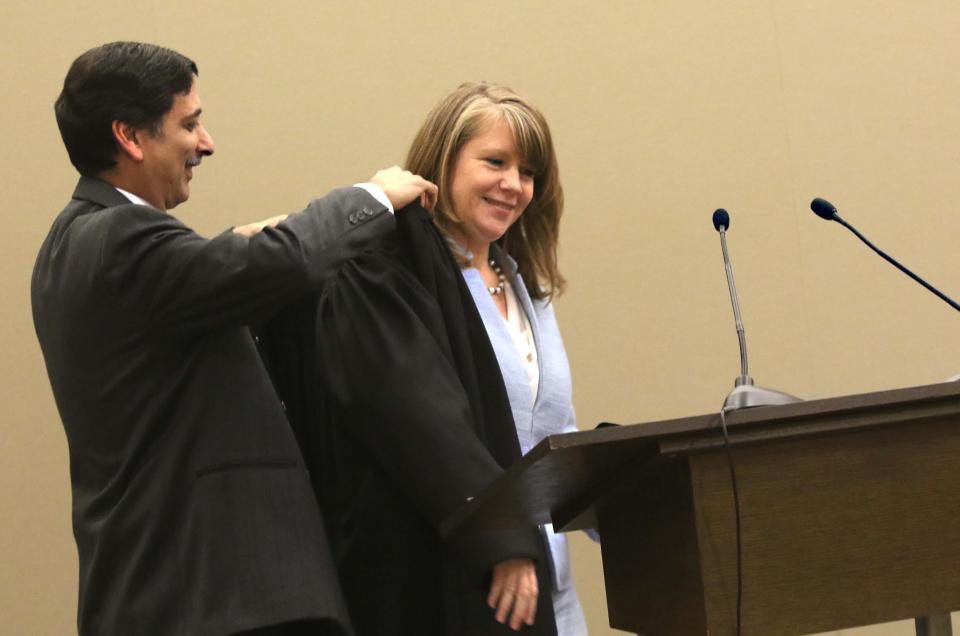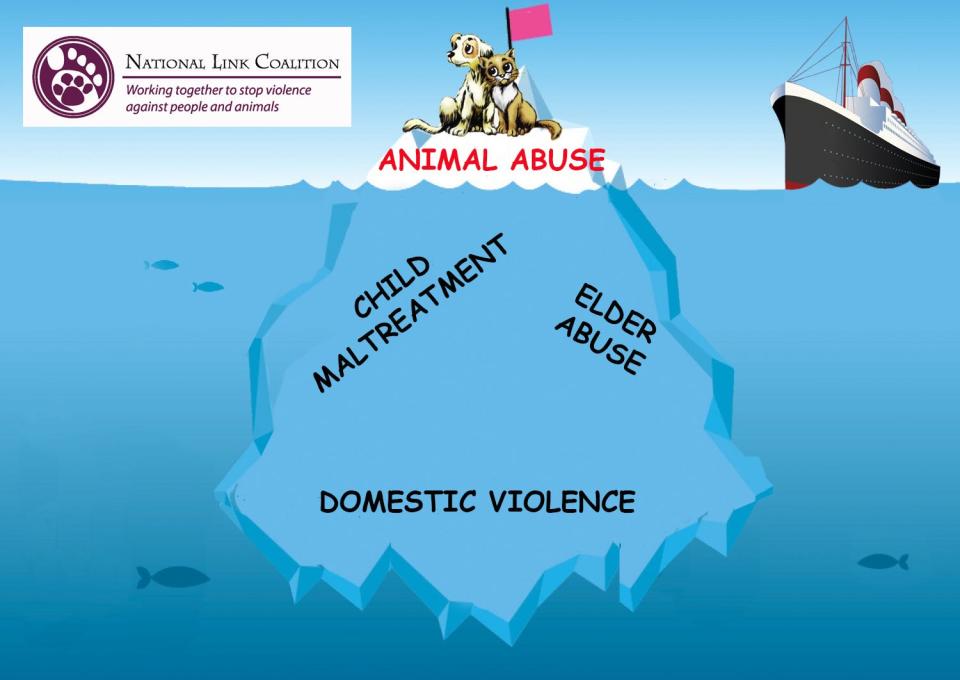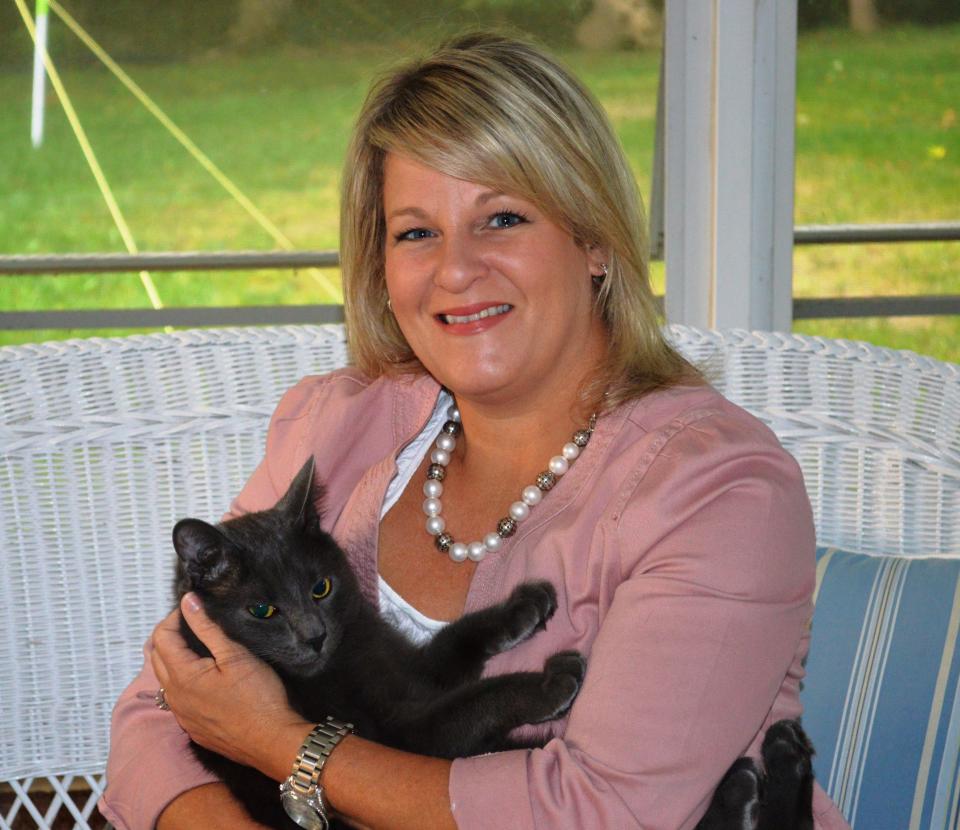How Delaware is addressing link between domestic violence, animal abuse
It was June 2017, and a Milford couple had been fighting for days.
Police had been called to the residence after neighbors reported hearing a verbal argument, according to a Delaware State Police spokesperson at the time.
Court documents obtained by Delaware Online/The News Journal show that the woman inside the home told police that her 27-year-old boyfriend had been intoxicated and yelling at her for about four days.
She said she was scared of him, according to court records, and was planning to file a Protection from Abuse order later that day.
Police were able to settle the argument, court documents state, and the woman put her two pit bulls in crates and left. Her boyfriend stood outside to wait for a ride, police said, but then went back inside to grab something.
When he “suddenly emerged,” police said that he yelled out that he had stabbed the dogs, claiming they were fighting. Both dogs were found dead inside, according to court records, along with the nearly foot-long knife that the man had used to kill them.
He was charged with possession of a deadly weapon during the commission of a felony, two counts of cruelty to animals and criminal mischief.
Phil Arkow, president and secretary of the National Link Coalition, said this is just one of many instances across the U.S. that exemplify the link between animal abuse and domestic violence—one that Delaware is taking steps to recognize and prevent.

Abuse of people can mean abuse of animals
The non-profit coalition that Arkow oversees was formed in 2008 around a central idea: when animals are abused, people are at risk; and when people are abused, animals are at risk.
Animal cruelty or threats of animal abuse can be used to intimidate, scare or manipulate others in the home by abusers, Arkow explained. Fear of harm coming to their pets is also a large barrier to leaving an abusive household.
Even if they do manage to leave with their pets, most domestic violence shelters—including all of those in Delaware—do not always allow people to bring animals, often due to lack of resources, Arkow said. This can lead survivors to return home to their abusers so that they aren’t separated from their pets.
About half of pet-owning domestic violence survivors who sought pro bono legal representation in Delaware in recent years said that their pet had also been abused, or that the abuser had threatened to harm the pet in order to control them, according to New Castle County Family Court Judge Jennifer Ranji.
Ranji, who previously served as the secretary of the Delaware Department of Services for Children, Youth and their Families, has seen the interconnectedness of animal abuse and domestic violence, child abuse and elder abuse–as well as the challenges that pet ownership poses to those trying to escape abusive situations–firsthand.

“It was something that intuitively made sense—that this was a really important thing when we're serving families and children to think about,” Ranji said. “But we just didn't really have a structure for that and it just wasn't rising to the surface.”
To bridge this gap, Ranji organized a day-long training to better learn and teach others about the link between domestic violence and animal abuse in April 2022.
Five months later, the Animal Abuse and Domestic Violence LINK Committee was born.
The Animal Abuse and Domestic Violence LINK Committee
The Animal Abuse and Domestic Violence LINK Committee, part of the state’s Domestic Violence Coordinating Council, seeks to learn more about how the link between animal abuse and domestic violence appears in Delaware, and take steps to proactively address the issues that it poses.
One of the biggest goals has been to teach family services to better recognize signs of animal abuse and, more importantly, teach animal services to recognize signs of domestic violence.
These agencies have historically been working in “silos,” Arkow said. Delaware is unique in that animal welfare services are centralized statewide. Other states that the National Link Coalition works with employ various disjointed agencies across different counties, which can make it difficult to train investigators on how to look for signs of domestic violence or other abuse when responding to complaints.

Delaware first consolidated its agencies into the Office of Animal Welfare in 2013. And while animal welfare officers in the First State are mandated to report suspected child abuse, Arkow said they often don’t know what to look for or who to report to.
The same can be said of law enforcement and child welfare agencies responding to suspected abuse, who may not know how to search for signs of animal abuse or how to fulfill their newly-mandated duty to report that abuse to the Office of Animal Welfare.
Efforts from the Animal Abuse and Domestic Violence LINK Committee—including the introduction of three new laws last year—seek to remedy that.
Shaping the law
The trio of bills relating to animal abuse and domestic violence was drafted and recommended to the General Assembly by the Domestic Violence Coordinating Council in March.
The first bill would allow Delawareans to file for a Protection for Abuse order against someone who abused their pet or service animal. The second would require law enforcement and child welfare agencies to report any suspected animal mistreatment to the Office of Animal Welfare.
The third would allow Family Court to award possession of pets in divorces after considering their wellbeing–a point of contention in and sometimes a roadblock to divorce that Ranji said she regularly saw.
All three bills were signed into law by the governor in late June, making Delaware the 13th state to allow someone to secure a protection from abuse order for animal abuse and the seventh to award custody of pets in a divorce, according to Arkow.
But in order for these laws to be effective, the relevant agencies have to understand the link between animal abuse and domestic violence, too–as well as what it means for them every day on the job.
Multidisciplinary training
In recent weeks, animal welfare officers have been meeting virtually with Arkow to hear from him about the link between animal abuse and domestic violence, child abuse and elder abuse. They have also been receiving training from the Office of the Child Advocate on the signs of child abuse that they should look for when responding to reports of animal abuse.
Office of Animal Welfare Director Christina Motoyoshi said these meetings are the first formalized training from outside agencies that the office has had on either subject. Animal welfare officers do complete mandatory reporter training as part of the certification process.

“The more we know about things, the more we can look into and attentively protect not only animals, but anyone else who might be in that family,” Motoyoshi said.
Making it mandatory to report suspected animal abuse in domestic violence will likely lead to an increase in reports, according to Motoyoshi.
“Because we're a small state, we can have statewide reach as a result of those efforts,” she said.
Seeing the impact on the state’s response to domestic abuse, domestic violence
Ranji said that she’s already heard from colleagues that Protection from Abuse orders based on animal abuse have been awarded, and said she expects this is the area where change will be seen most quickly.
The state’s court system does not yet have the infrastructure to analyze data from Protection from Abuse orders about whether pet-related relief was granted, Ranji said, as the orders are not filed online.
In the meantime, she and the other members of the committee are focused on raising broader awareness of the interconnectedness of animal abuse and domestic violence across various sectors in the state, focusing especially on first responders.
The committee has plans to possibly host more awareness events and seminars in the fall, and are working to build questions about animal abuse into domestic violence risk assessments and screenings.
Anyone who suspects child sexual or physical abuse or neglect is asked to call the Division of Family Services hotline at 800-292-9582.
Anyone who suspects animal cruelty or neglect is asked to call Delaware Animal Services at 302-255-4646.
How to get help
Delaware Domestic Violence Hotlines: For New Castle County, call 302-762-6110. For Kent and Sussex County, call 302-422-8058. Para español, llame al 302-745-9874.
National Suicide Hotline: 988
Crisis Text Line: Text HOME to 741741 for crisis support
National Child Abuse Hotline: 800-422-4453
National Domestic Violence Hotline: 800-799-7233
Send story tips or ideas to Hannah Edelman at hedelman@delawareonline.com. For more reporting, follow them on X at @h_edelman.
This article originally appeared on Delaware News Journal: Animal abuse, domestic violence link focus of new trainings

